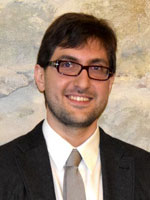
Contact
Triad Technology Center333 Cassell Drive
Baltimore, MD 21224
Email: alessandro.bonifazi2@nih.gov
Education
Ph.D. - Pharmaceutical Sciences - University of Camerino, Italy (Advisor: Prof. Wilma Quaglia)
M.S. - Pharmaceutical Chemistry and Technology - University of Camerino, Italy (Italy)
Research Interests
Alessandro Bonifazi received his Master’s Degree in Pharmaceutical Chemistry and Technology at the University of Camerino (Italy) in 2010. He continued as a Ph.D. candidate in Pharmaceutical Sciences at University of Camerino (School of Advanced Studies) – Medicinal Chemistry Unit, under the mentorship of Prof. Wilma Quaglia, focusing his research efforts on the design, synthesis, purification and structural characterization of 1,4-dioxane ligands interacting with different receptor systems depending on the specific substituents inserted in the core scaffold. During his Ph.D. studies, in 2012, he spent six months as pre-doctoral Visiting Fellow at the National Institute on Drug Abuse (NIDA) in Baltimore, under the supervision of Dr. Amy H. Newman and Dr. Thomas M. Keck, where he synthesized and tested, using in vitro radioligand binding assays, novel selective dopamine D3 receptor antagonists as potential tools for the treatment of drug abuse. In 2013, Alessandro worked five months as pre-doctoral Visiting Fellow at the Westfålische Wilhelms-Universitåt in Münster (Germany), under the guidance of Prof. Bernhard Wünsch and Dr. Dirk Schepmann, where he tested novel series of ligands for PCP-binding site of NMDA receptor, σ1, σ2 and opioid receptor subtypes. Alessandro received his Ph.D. in March 2014 and he re-joined the Medicinal Chemistry Section of the Molecular Targets and Medications Discovery Branch, as a Postdoctoral Fellow in the laboratory of Dr. Amy H. Newman in June 2014. In addition to performing and developing multiple cell- and tissue-based radioligand binding assays, his research projects include the rational design of highly selective D2 and D3 receptor agonists with the aim to elucidate ligand-receptor interactions necessary to activate specific signaling pathways.
Publications
